In the Fulness of Time/Part 77
| By: Dr. Thomas O. Figart; ©2007 |
| The twofold purpose of the traditional Sabbath law was “to secure, negatively, absolute rest from all labour, and, positively, to make the Sabbath a delight”. In order to guarantee this, the Pharisees had invented “burdensome rules with which they encumbered everything connected with its sanctity”. Did Jesus agree with the Pharisees? |
The Nation of Israel Openly Opposed Him. Matthew 12:1-50
Concerning the Sabbath. Matthew 12:1-13
He Showed that Lordship Supercedes the Law of the Sabbath. 12:1-8
Illustration #1: He is Greater than David. 12:1-4
The Accusation: The Disciples and the Grain. 12:1-2
- Mt. 12:1-2 “At that time Jesus went on the Sabbath day through the grainfields; and his disciples were hungry, and began to pluck the ears of grain, and to eat. But when the Pharisees saw it, they said unto him, Behold they disciples do that which is not lawful to do on the Sabbath day.”The actual law of the Sabbath originated in Exodus 20:8-11 as “the Sabbath of the LORD thy God’ in it thou shall not do any work…. For in six days the LORD made heaven and earth…. and rested the seventh day; wherefore the LORD blessed the sabbath day, and hallowed it.”
The twofold purpose of the traditional Sabbath law was “to secure, negatively, absolute rest from all labour, and, positively, to make the Sabbath a delight” (Edersheim, Life and Times of Jesus the Messiah, Volume 2, p. 52). In order to guarantee this, the Pharisees had invented “burdensome rules with which they encumbered everything connected with its sanctity” (Ibid.). The disciples plucked the grain and then rubbed it in their hands (Luke 6:2) in order to remove the husks. The plucking constituted the sin of reaping and the rubbing was considered threshing. If they had done this on any other day it would have been legal (Deuteronomy 23:25), but not on the Sabbath day! (Cf. Edersheim, Op. cit. pp. 777-778).
The Answer: David and the Shewbread. 12:3-4
- Mt. 12:3-4 “But he said unto them, Have ye not read what David did, when he was hungry, and they that were with him, How he entered into the house of God, and did eat the shewbread, which was not lawful for him to eat, neither for them who were with him, but only for the priests?”The showbread was put in hot every Sabbath and the old bread taken out (Leviticus 24:8; I Chronicles 9:32). In Leviticus 22:10-16 there is a list of those who may or may not eat of the holy things. When David came to Nob, he asked for bread. Ahimelech the priest had no common bread, but there was “hallowed bread, if the young men have kept themselves at least from women” (I Samuel 21:4). David assured Ahimelech that they were ceremonially clean, so the priest gave them the old bread and the hot bread was put in on the Sabbath.
When Jesus used the illustration concerning David He made two basic points: first, David and his men had a “need” (Mark 2:25) which involved hunger; and second, they asked for an exception to the Law so they could eat showbread. Christ does not mention that David called the showbread common, in a way, even if it had been freshly baked and hallowed in the table that very day. Nor does Jesus mention the cleanness of David’s men.
The major thrust of our Lord’s argument is that if David could take the showbread and not be condemned, certainly He, Who is Lord of the Sabbath could permit His disciples to pluck grain and eat it on the sabbath. A ceremonial law is superseded by a higher law, in this case, service for the Lord. Even though David lied about being on a mission from King Saul, this also, is never mentioned by Christ. David was righteous in his service for Jehovah and his hungry servant needed to eat.
In Revelation 22:3 it is revealed that in the New Jerusalem, “There shall be no more curse, but the throne of God and the Lamb shall be in it, and His servants shall serve Him.” This is not true now, but it will come to pass “in the fulness of time!”








[…] In the Fulness of Time – Part 77 By: Dr. Thomas O. Figart […]
[…] Previous Article […]